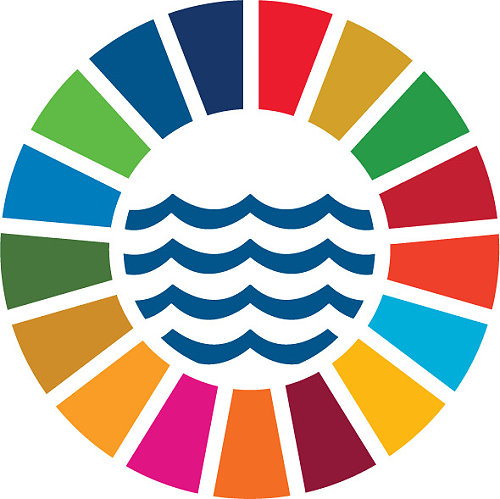 United Nations Ocean Conference (UNOC 3), Nice, France, 9-13 June 2025 – co-hosted by France and Costa Rica.
United Nations Ocean Conference (UNOC 3), Nice, France, 9-13 June 2025 – co-hosted by France and Costa Rica.
Together with several partners, Mundus maris proposes a side event in the Blue Zone. The co-organisers are:
Federal Ministry for the Environment, Nature Conservation, Nuclear Safety and Consumer Protection of Germany;
Deutsche Allianz für Meeresforschung (German Alliance for Marine Research);
German Ocean Foundation;
the Association Terra Curanda, Belgium/Argentina;
Seas At Risk, Belgium.
The National Decade Committee for Belgium has kindly provided some financial support.
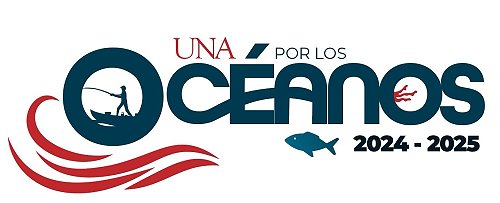 Universidad Nacional de Costa Rica is a Special Guest.
Universidad Nacional de Costa Rica is a Special Guest.
📌 How to Participate in the In-Person Activity
Format: A flexible, interactive event during one or two days (75min each), with the 4 paper notebooks plus four notebooks for electronic recording placed on two table. The covers of the notebooks will feature details of the selected paintings.
Interaction: Participants can write directly in the paper notebooks in designated spaces. Additionally, A5-sized cards will be available for participants to write or draw their contributions, which can be attached to the notebooks. Additionally, the digital notebooks are available for direct recording of views, suggestions, comments.
Organisation: Members of the non-profit Mundus maris, along with partners and participants, introduce each topic and encourage dialogue. Participants are invited to write, draft, copy texts, pictures, commentary in the paper and/or digital notebooks.
Discussions: 4 short talks will be held, each with a 2-minute introduction and 3 minutes of audience interaction, based on texts already written in the notebooks.
Accessibility: The event will be conducted in three languages: English, French (for France), and Spanish (for Costa Rica). Drawings are also accepted as contributions.
Setup: It is desirable to have two tables and at least four chairs for participants.
Presentation: The notebooks will be discretely tied to a fishing net of ideas, thoughts, and art, symbolizing the interconnected nature of ocean-related issues.
Code of Conduct: All texts and contributions must adhere to ethical guidelines aligned with UNOC3 and its action themes and international UN rules.
Closing: After the event, the digital notebooks will be donated to UNOC3, UNESCO Ocean Literacy or to local groups defending the ocean as a legacy of the event.
Sharing: A selection of contributions will be made available after UNOC3 on the Mundus maris and partner websites. Particularly interesting contributions will be compiled in a nicely layouted book similar to the Book of the Marine World done with youth contributions for World Ocean Day.
Notebook 1: The Ocean and Its People
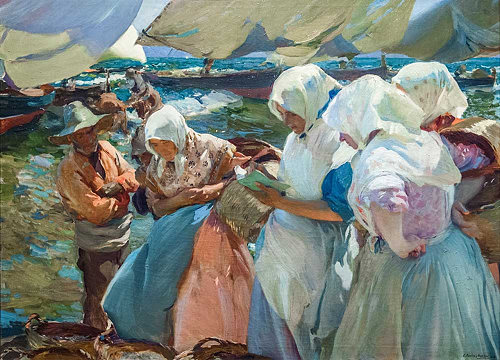 🎨 Original Painting: Valencian Fisherwomen (Joaquín Sorolla, 1903)
🎨 Original Painting: Valencian Fisherwomen (Joaquín Sorolla, 1903)
🔍 Central Question: How can we recognize the ocean as an essential part of all humanity and ensure its protection?
📊 Context: The ocean is home to millions of species, supports coastal communities, and provides food, oxygen and climate regulation. However, its health is often compromised by short-term decisions. Coastal areas are under pressure due to urbanization, tourism, and climate change. Coastal communities, including small-scale fishers and indigenous peoples, need a voice so that stewardship and benefits are fairly shared using also science and local ecological knowledges.
🌱 Related SDGs: 3, 11, 13, 14, 15
Notebook 2: The Ocean and Its Diversity
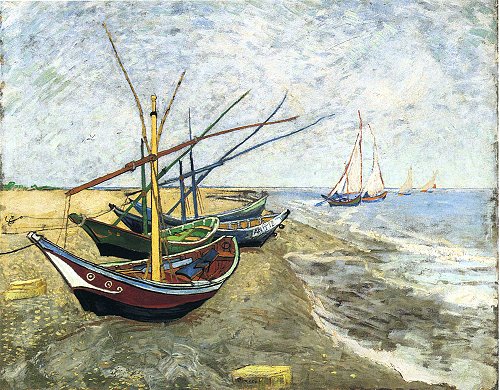 🎨 Original Painting: Fishing Boats (Vincent Van Gogh, 1888)
🎨 Original Painting: Fishing Boats (Vincent Van Gogh, 1888)
🔍 Central Question: How can we balance ocean exploitation with recovery and conservation?
📊 Context: The ocean is a vast and largely unexplored ecosystem, yet it faces threats such as overfishing, habitat destruction, pollution, and deep-sea mining. The High Seas, which cover 64% of the ocean, remain unregulated. Recovery of ocean health, responsible fisheries and marine protection are essential to maintaining biodiversity and safeguarding ocean services for all. Research has already generated insights e.g. in the benefits of the ecosystem approach to fisheries, but needs to be shared more widely through ocean literacy and respecting indigenous knowledges.
🌱 Related SDGs: 9, 10, 12, 14, 16
Notebook 3: The Ocean and Climate Change
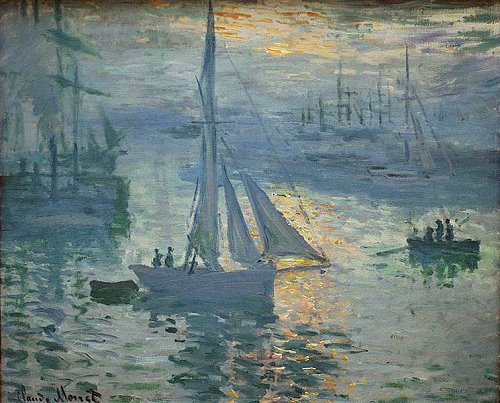 🎨 Original Painting: Seascape at Sunrise (Claude Monet, 1873)
🎨 Original Painting: Seascape at Sunrise (Claude Monet, 1873)
🔍 Central Question: Will the ocean save us from climate change, or are we destroying it?
📊 Context: The ocean is the planet’s main climate regulator, absorbing CO2 and heat. However, rising sea levels, ocean acidification, and extreme weather threaten both human populations and marine ecosystems. Energy transition and conservation efforts must align with greater ocean health.
🌱 Related SDGs: 7, 13, 14
Notebook 4: The Ocean as a Common Good
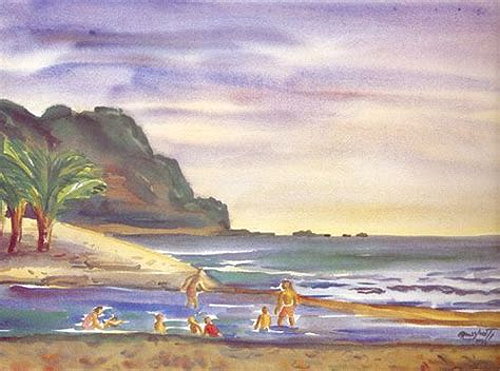
🔍 Central Question: How can we ensure the ocean remains a shared resource for all?
📊 Context: The ocean is a global commons, yet it is increasingly exploited for commercial interests of a few. Beyond its economic and environmental significance, the ocean also holds an intangible cultural and spiritual value for humanity, as recognized by UNESCO. Protecting marine heritage, traditional knowledges, and cultural expressions linked to the ocean are fundamental for future generations. Maritime culture, inclusive governance, judicious use of science and legal frameworks such as the High Seas Treaty and the Global Biodiversity Framework are critical for its future. Global principles need to be connected to locally adapted implementation. Technology can either support or harm marine health.
🌱 Related SDGs: 14, 16, 17
